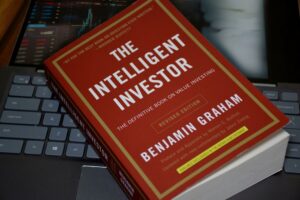Ask the average investor how they invest, and you will get one of two answers.
‘Fundamental Analysis’ or ‘Technical Analysis’, and never the two shall meet.
It all goes back to Benjamin Graham, who wrote ‘The Intelligent Investor’ in 1949, the Bible of Fundamental Analysis.
In there was the line:
“We do not hesitate to declare that (Technical Analysis) is as fallacious as it is popular.”
In that one sentence he erected a wall between Fundamental and Technical Analysis, or to put it another way, between investors and traders, and it has stood for 62 years, with the proponents of both seemingly hell bent on putting each other down, and they both have their points.
The Bad Bits
Traders will tell you that investors:
- Are embarrassingly useless at ‘timing the market’. They declare that it can’t be done. How ridiculous. They are going to wear the next GFC right on the nose.
- Can’t sell. They don’t. They don’t know how.
- Aren’t disciplined. They don’t have any discipline. They’ll watch stocks get destroyed without doing anything about it, and the bigger the loss, the more likely they are to persist with it.
- Aren’t vigilant. They ‘set and forget’. Forget! About their money! What planet are they on?
- Don’t have a Trading Plan. They don’t have one. Incredible. Net result, they let their losses run and cut their profits. The complete opposite of what they should be doing.
- Are emotional. They believe the things that make them feel good, and disregard the things that make them feel bad. They listen to stock tips. They invest on the thinnest of evidence. It’s not rational.
- Are ‘lemmings’. They get in when it’s obvious, and get out when it’s obvious. Put another way, they buy at the top and sell at the bottom.
- Are often wrong. Do you know how many flawed assumptions go into Fundamental Analysis, into those highbrow calculations of intrinsic value? Rubbish in, rubbish out, no matter how smart the calculation.
Investors will tell you that traders:
- Rely on past prices as a predictor of future prices, which is ridiculous.
- Know nothing about a company. They might as well trade cabbages.
- Are short-term, which means they’ll never see the magic of compounding returns.
- Don’t care about dividends and miss out on franking.
- Will never get hold of a great stock and keep it forever because they fidget.
- Can’t actually time the market anyway, despite professing to do so.
- Are ‘lemmings’. They just look at what everyone else is doing and follows them.
- Have to spend all day doing it, so don’t have a life.
- Are out of touch. Many technical devotees use their reliance on charts as an excuse to never read or watch stock announcements, the news, politics.
- “Have you ever met a rich technical analyst?”
But the truth is that they both have a lot to learn from each other, and if we look at the positives instead of the negatives, you’ll see why.
The Good Bits
Traders:
- Are not just technical analysts, they are traders (there’s a difference), which means they have trading skills. These skills are universal, and are as useful for investors as they are for traders.
- Are not short-term. Trading techniques can be applied over any time frame. Apply them over minutes and hours, and yes, it is gambling. Apply them over days, and it is trading. Apply them over weeks and months, and it is investing. You can easily adapt trading skills to any investor.
- Have exactly the same ambition as a long-term investor, as Warren Buffett even, the ambition to buy a stock that goes up forever. They are doing exactly the same thing.
- Have a Trading Plan, and because of that, they never miss a night’s sleep.
- Are unemotional. They know what they are going to do at all times, because from the moment they buy a stock, they have a system.
- Are decisive. Traders never prevaricate, they never agonise, they know what to do, they decided way before the trade was even opened.
- They are honest. They know that making money in the stock market is about buying stocks with a high probability of going up. It’s not about predicting the future. No-one can do that.
- Are not proud. They know that things will change, that they will get themselves into a pickle. The difference is that when they do they act, they don’t stand by some grand but flawed declaration about the future through thick and thin.
- Are not ‘lemmings’. On the contrary, they see the market as a battlefield, as combat, one on one. They know they are in a war with the herd, and because of that, they retain an independence of mind and action.
- See trading as a business, and they analyse their success and failure like a business. They constantly adapt, educate, and improve.
Investors:
- Are good at identifying companies that make money, and that’s the root of it all in the long-term.
- Are good at identifying rubbish companies.
- Can identify good management.
- Can identify sector trends.
- Are well read.
The Bottom Line
As any experienced trader will tell you, there is no Holy Grail for success, no one approach that works.
Amidst so much grey and so little black and white, the game is simply about trying to get an edge on random outcomes, and to do that you would be a fool not to use every tool in the shed, and that’s the point, every tool. Not one or the other, but every.
You dismiss nothing and learn everything, and this is where so many people go wrong. They decide they are in one camp or the other, when it would be far more effective to be in both.
The bottom line is that you make a big mistake writing off traders as an investor, or investors as a trader. They both have some good bits, and some great bits. You would do well to explore both.




